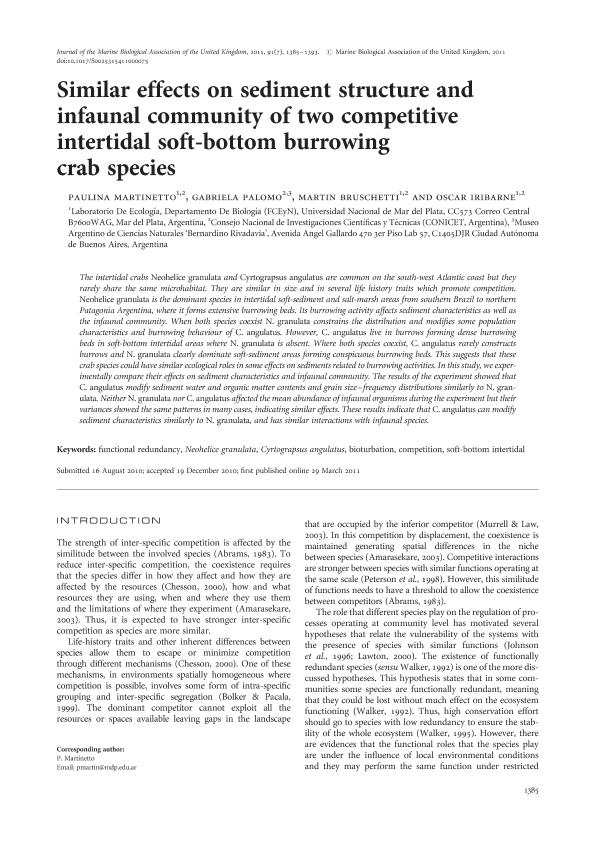Mostrar el registro sencillo del ítem
dc.contributor.author
Martinetto, Paulina Maria del Rosario

dc.contributor.author
Palomo, Maria Gabriela

dc.contributor.author
Bruschetti, Carlos Martin

dc.contributor.author
Iribarne, Oscar Osvaldo

dc.date.available
2019-01-30T17:05:32Z
dc.date.issued
2011-11
dc.identifier.citation
Martinetto, Paulina Maria del Rosario; Palomo, Maria Gabriela; Bruschetti, Carlos Martin; Iribarne, Oscar Osvaldo; Similar effects on sediment structure and infaunal community of two competitive intertidal soft-bottom burrowing crab species; Cambridge University Press; Journal of the Marine Biological Association of the United Kingdom; 91; 7; 11-2011; 1385-1393
dc.identifier.issn
0025-3154
dc.identifier.uri
http://hdl.handle.net/11336/68996
dc.description.abstract
The intertidal crabs Neohelice granulata and Cyrtograpsus angulatus are common on the south-west Atlantic coast but they rarely share the same microhabitat. They are similar in size and in several life history traits which promote competition. Neohelice granulata is the dominant species in intertidal soft-sediment and salt-marsh areas from southern Brazil to northern Patagonia Argentina, where it forms extensive burrowing beds. Its burrowing activity affects sediment characteristics as well as the infaunal community. When both species coexist N. granulata constrains the distribution and modifies some population characteristics and burrowing behaviour of C. angulatus. However, C. angulatus live in burrows forming dense burrowing beds in soft-bottom intertidal areas where N. granulata is absent. Where both species coexist, C. angulatus rarely constructs burrows and N. granulata clearly dominate soft-sediment areas forming conspicuous burrowing beds. This suggests that these crab species could have similar ecological roles in some effects on sediments related to burrowing activities. In this study, we experimentally compare their effects on sediment characteristics and infaunal community. The results of the experiment showed that C. angulatus modify sediment water and organic matter contents and grain size-frequency distributions similarly to N. granulata. Neither N. granulata nor C. angulatus affected the mean abundance of infaunal organisms during the experiment but their variances showed the same patterns in many cases, indicating similar effects. These results indicate that C. angulatus can modify sediment characteristics similarly to N. granulata, and has similar interactions with infaunal species.
dc.format
application/pdf
dc.language.iso
eng
dc.publisher
Cambridge University Press

dc.rights
info:eu-repo/semantics/openAccess
dc.rights.uri
https://creativecommons.org/licenses/by-nc-sa/2.5/ar/
dc.subject
Bioturbation
dc.subject
Competition
dc.subject
Cyrtograpsus Angulatus
dc.subject
Functional Redundancy
dc.subject
Neohelice Granulata
dc.subject
Soft-Bottom Intertidal
dc.subject.classification
Otras Ciencias Biológicas

dc.subject.classification
Ciencias Biológicas

dc.subject.classification
CIENCIAS NATURALES Y EXACTAS

dc.title
Similar effects on sediment structure and infaunal community of two competitive intertidal soft-bottom burrowing crab species
dc.type
info:eu-repo/semantics/article
dc.type
info:ar-repo/semantics/artículo
dc.type
info:eu-repo/semantics/publishedVersion
dc.date.updated
2019-01-30T13:54:21Z
dc.journal.volume
91
dc.journal.number
7
dc.journal.pagination
1385-1393
dc.journal.pais
Reino Unido

dc.journal.ciudad
Cambridge
dc.description.fil
Fil: Martinetto, Paulina Maria del Rosario. Universidad Nacional de Mar del Plata. Facultad de Ciencias Exactas y Naturales. Departamento de Biología; Argentina. Consejo Nacional de Investigaciones Científicas y Técnicas; Argentina
dc.description.fil
Fil: Palomo, Maria Gabriela. Consejo Nacional de Investigaciones Científicas y Técnicas. Oficina de Coordinación Administrativa Parque Centenario. Museo Argentino de Ciencias Naturales “Bernardino Rivadavia”; Argentina
dc.description.fil
Fil: Bruschetti, Carlos Martin. Universidad Nacional de Mar del Plata. Facultad de Ciencias Exactas y Naturales. Departamento de Biología; Argentina. Consejo Nacional de Investigaciones Científicas y Técnicas; Argentina
dc.description.fil
Fil: Iribarne, Oscar Osvaldo. Universidad Nacional de Mar del Plata. Facultad de Ciencias Exactas y Naturales. Departamento de Biología; Argentina. Consejo Nacional de Investigaciones Científicas y Técnicas; Argentina
dc.journal.title
Journal of the Marine Biological Association of the United Kingdom

dc.relation.alternativeid
info:eu-repo/semantics/altIdentifier/doi/http://dx.doi.org/10.1017/S0025315411000075
dc.relation.alternativeid
info:eu-repo/semantics/altIdentifier/url/https://www.cambridge.org/core/journals/journal-of-the-marine-biological-association-of-the-united-kingdom/article/similar-effects-on-sediment-structure-and-infaunal-community-of-two-competitive-intertidal-softbottom-burrowing-crab-species/383B14BEF1516AA38346D7996BFEB9A3
Archivos asociados
